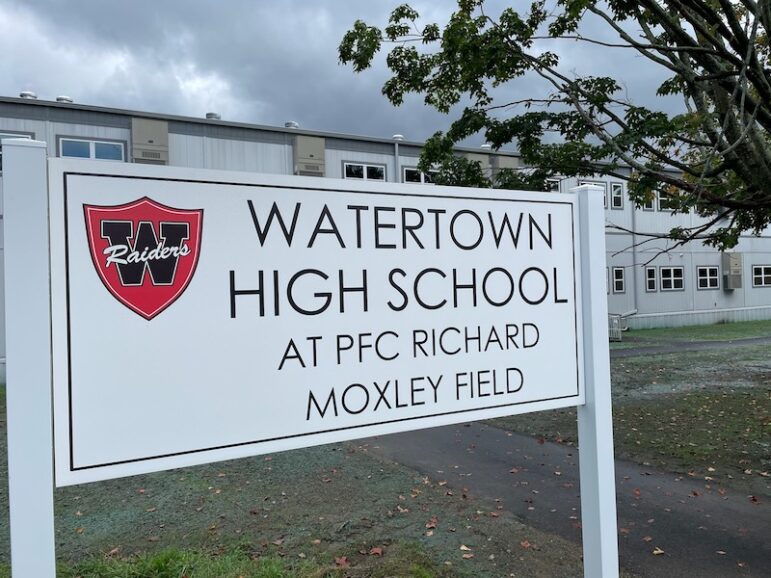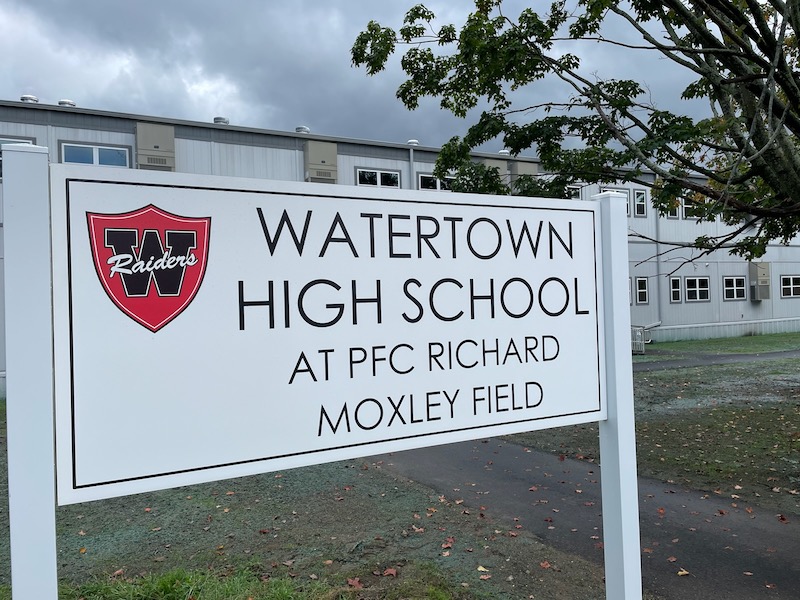
City Councilors unanimously voted to purchase the modular classrooms set up on Moxley Field on Tuesday. The City will make up the cost by eliminating leasing costs, and by owning them there will no longer be a rush to start a project to renovate or rebuild Watertown Middle School and there are hopes of reducing the price tag for that project.
In the latest meeting regarding the future of the Middle School, City Manager George Proakis said buying the modulars for $2.2 million makes sense. It gives School and City officials time to plan because the current lease of the modulars ends on April 30, 2026. It also saves the cost of continuing to lease the modulars. Plus, Watertown could use a different method of planning and building or fully renovating the Middle School, which will likely save millions.
Christy Murphy from project management firm Vertex, said the total cost estimate of rebuilding the Middle School was made using a method that would allow for hiring a contractor and designing at the same time. She presented that number in September.
“That was the initial feasibility study,” Murphy said. “When we looked at it as a construction manager, releasing early (design) packages, reducing time, and it went to $112 million.”
She added that just by owning the modulars, the cost of building a new Middle School drops by an estimated $3 million, to $109 million. That represents the cost of leasing the modulars.
City Council President Mark Sideris said by switching to the design-bid-build model for the project, he is hopeful for more savings.
“It would also potentially go down further, much further, if we did the design-bid-build versus the construction manager at risk method,” Sideris said. “Design-bid-build is how we did all our other schools. When you put a construction manager at risk, they’re taking all the risk for cost escalations, so you pay a premium for that. I’m going to say (we could have) 5 to 8 percent additional savings, potentially if we go (with design-bid-build).”
The time might be right for getting a good price on bids for the project, Murphy said.
“There are, there are people that need work. We know life science work isn’t happening, higher ed work isn’t happening,” Murphy said. “There’s contractors that need work that would likely render good results on bid day.”
Murphy added that it is not clear whether the high school will be ready to move into by the projected date of April 2026.
“We’re working through a challenge that the (general contractor Brait Builders) has come across, where some of the, actually the majority of the concrete slabs, are having a delamination issue, and we’re needing to mitigate those,” Murphy said. “It has presented a schedule risk.”
Sideris said he wants to avoid the situation that occurred at the Lowell School, which was not completely finished and tested.
Murphy said, “We could find ourselves in a position where you could open the school and take occupancy, but not have all the systems shaken out and working quite properly. And I understand you took that on because you needed to with one of the elementary schools, and it was quite challenging for the school to be in it while things were being shaken out.”
Proakis said purchasing the modulars gives the flexibility of high schoolers staying in the modulars until the new school is totally ready.
“If we purchase the structure, we own the structure, we we own our control of the situation and and we gain back control of the timing rush that is on the decision making related to this, to the middle school project,” Proakis said. “We also mitigate a risk with the High School Project.”
He added that owning the modulars also comes with risks and responsibilities. The City would have to pay for the maintenance and repairs of the modulars.
The City will also have the chance to try to recoup more money by selling the modulars after they are no longer needed. Murphy said it is possible they could all be sold, or half, or that the least costly thing is to demolish them. But she said they have multiple uses.
“They get used on some of the military bases, swing space, housing,” she said. “They have a lot of use, not just schools.”
Proakis said he would like time to not just to be able have the Middle School project designed, but also to figure out if the City can afford to move ahead, given economic projections.
“I look at the possibility of moving away from CM at risk because the initial time pressure is off. I look at having more detailed design documents to be able to bid off of a few months from now, allowing us to have more information,” Proakis said. “And I also look at, by the way, settling the question of whether or not we’re going to have a Home Rule Petition passed on the tax split.”
If the tax split is not passed, Proakis said there would be a substantial tax increase for residential property owners. Some pointed to using the money the City has been using to pay down the deficit in other post employment benefits (OPEB), about $4 million a year, to offset the cost of the project. Proakis said that may not be enough if the Home Rule Petition is not approved by the State Legislature.
“I really feel like that’s an important piece of it right now, just because if we commit to the school, and we commit to the other capital project work we’re doing, and we figure out our way around it, and even if we slow OPEB to zero over the next couple of years — if the tax split petition doesn’t pass, I’m either asking you to slice millions of dollars out of the operating budget in 2027, 28 and 29, or I am asking you to vote an 18 percent tax increase,” Proakis said.
Councilors also asked about the timeframe for going with a design-bid-build project. Murphy said Vertex should be able to come up with a cost estimate in four to five months. The time to create a “biddable set of documents” would take about 12 to 14 months, she added.
Proakis said by buying the modulars, Watertown could also explore the possibility of getting the Massachusetts School Building Authority (MSBA) to reimburse a significant amount of the project. Sideris said he and Superintendent Dede Galdston will attend an MSBA forum in January to learn what it would take to submit a statement of interest to get the Middle School project into the MSBA program. Applying for MSBA funding, even if successful the first time, would extend the timeline for the project.
